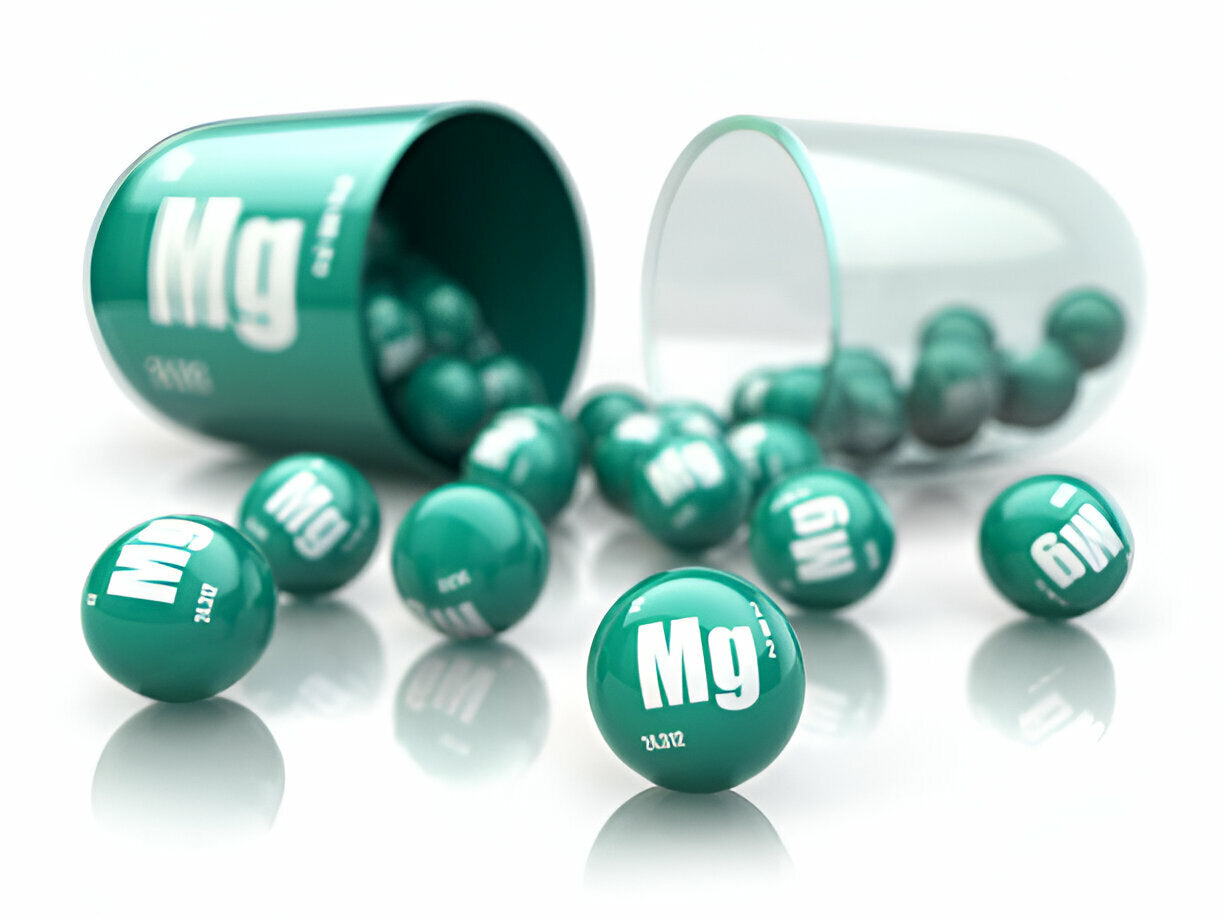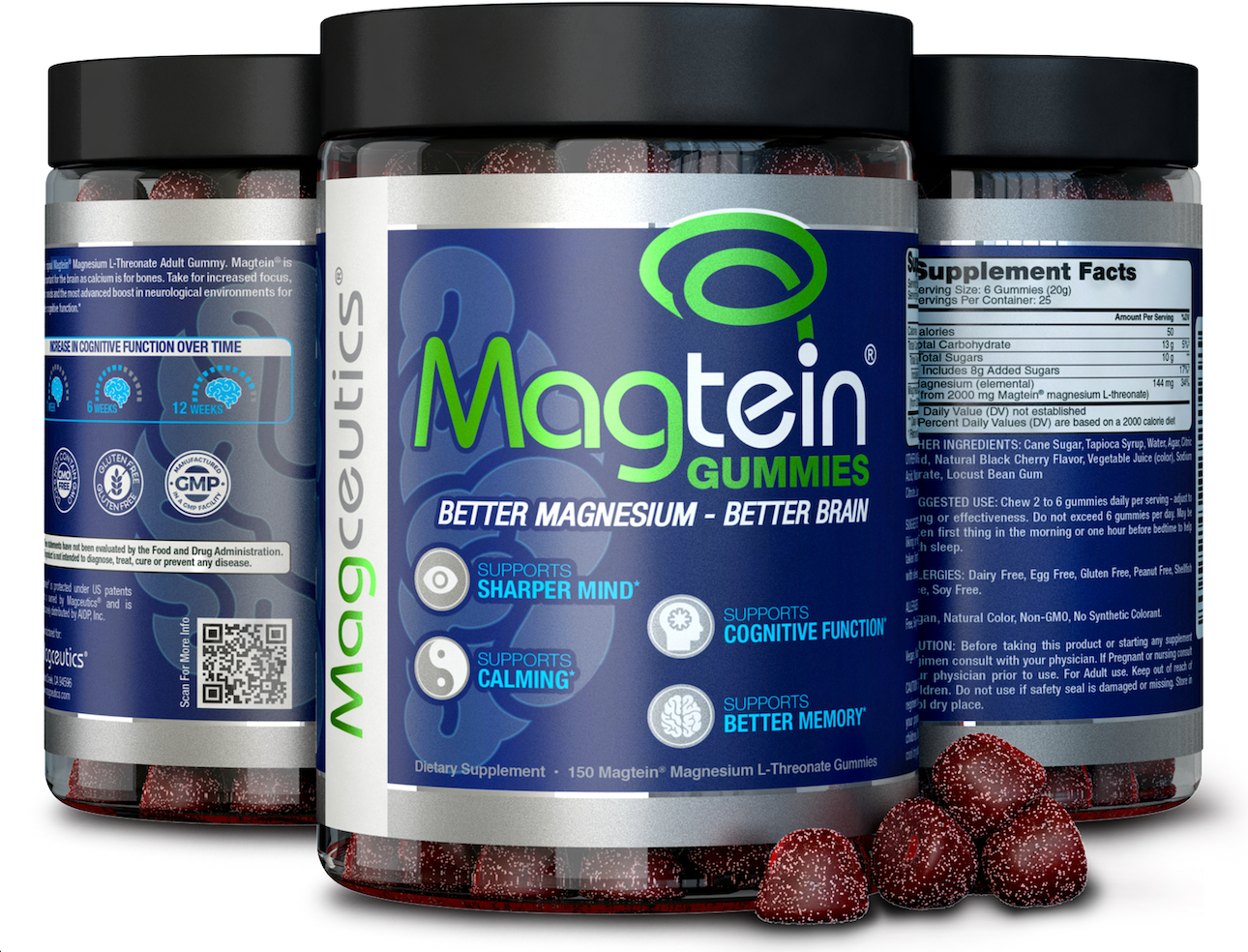Article: 5 THINGS YOU DIDN’T KNOW ABOUT MAGNESIUM

5 THINGS YOU DIDN’T KNOW ABOUT MAGNESIUM
You Probably Aren’t Getting Enough
Approximately 50% of the population is not getting the estimated average requirement for magnesium (~420 mg of magnesium).1 Most Americans are only consuming around 250 mg of magnesium per day1 and would benefit from getting an additional 150-200 mg of magnesium. This has to do with the fact that refining grain removes 70-80% of the magnesium.2 Furthermore, since the 1850s, wheats have declined in magnesium concentration by 7-29% and vegetables by 15-23%.3 Since 1930, fruits and vegetables have dropped in magnesium concentration by 35%.4 Up to 30% of the population is magnesium deficient based on low serum magnesium levels and up to 84% of certain patient populations are magnesium deficient when using the gold standard IV magnesium load test.1 Thus, hidden magnesium deficiency is common throughout the population, and it leads to numerous health issues.
Magnesium is Important for Mood
The first report of magnesium for improving mood was published in 1921 showing success in 220 out of 250 cases.5 Since then, numerous case reports have found rapid improvements in mood with the use of magnesium supplementation.5 Additionally, a randomized trial showed that magnesium supplementation was just as effective as an antidepressant for improving mood.6 Thus, clinical studies in humans suggests that magnesium supplementation is beneficial for improving mood.
Approximately 60% of individuals who have a depressed mood are considered treatment-resistant and this may be due to magnesium deficiency.5 Indeed, low magnesium levels correlate with poor outcomes in in individuals with a depressed mood who do not respond to medications,7 whereas higher magnesium intakes are associated with better mood scores.8 All of this suggests a potential role for magnesium in mental health.
Magnesium in the brain is needed to make the “feel good” neurotransmitters, such as serotonin, dopamine, and noradrenaline.9 However, only magnesium L-threonate increases brain magnesium levels, even when compared to magnesium citrate, glycinate, gluconate, malate, and chloride.10, 11 In summary, depressed mood may simply be a sign of magnesium deficiency in the brain. Boosting brain magnesium levels, particularly with the use of magnesium L-threonate, may have profound benefits on mood.
Symptoms of magnesium deficiency can include depressed mood, confusion and agitation.12 Individuals with depression are known to have lower magnesium levels in the blood13 and the brain.5 Furthermore, individuals with depression have low cerebral spinal fluid magnesium.5 However, cerebral spinal fluid magnesium levels are tightly controlled and difficult to increase.14 However, magnesium L-threonate has improved effectiveness for increasing cerebrospinal fluid magnesium levels compared to other magnesium supplements.11 Indeed, only magnesium L-threonate, as opposed to magnesium chloride or gluconate, increases cerebrospinal fluid magnesium levels and improves cognition in animal models.11
Summary of Magnesium and Mood:
Individual with depressed mood haveLower magnesium levels in the blood13and the brain.5Low cerebral spinal fluid magnesium.5Magnesium L-threonate has improved effectiveness for increasing cerebrospinal fluid magnesium levels.11Only magnesium L-threonate, as opposed to magnesium chloride or magnesium gluconate, increases cerebrospinal fluid magnesium levels, and improves cognition in animal models.11
Magnesium May Help with Stress, Fear, Phobias and PTSD
Many individuals who lead stressful lives have an higher intake of alcohol, coffee, or caffeine, which increase the elimination of magnesium out in the urine.15, 16 High levels of stress can lead to magnesium deficiency by increasing the amount of magnesium that is lost in the urine.17, 18 Moreover, magnesium deficiency enhances the stress response.17 Indeed, magnesium deficiency increases stress-induced mortality in animals,19 whereas compensation for magnesium deficiency improves the ability of the nervous system to resist stress.17 Thus, stress leads to magnesium deficiency and magnesium deficiency leads to stress.
Animals receiving diets low in magnesium display increased anxiety-related behavior,20 and this may be due to hyper-excitability in the brain and increased cortisol production.21 Importantly, two studies have shown that supplementing animals with magnesium L-threonate reduces anxiety.22, 23 Thus, mechanistic and animal data suggests that magnesium may have a central role in the relief of anxiety.
Anxiety disorders, such as phobias and post-traumatic stress disorders, are some of the most common mental disorders. Currently, there are limited treatments for these patients. Studies suggest that enhancing the plasticity of certain brain regions may improve health outcomes in these individuals. Magnesium L-threonate, through its ability to enhance brain magnesium levels, can enhance synaptic plasticity, enhance the extinction of fear memory, without erasing the original fear memory. 17 Other studies corroborate these findings and suggest that magnesium L-threonate is indeed helpful in fear disorders.22, 23
In summary, anxiety can cause magnesium deficiency and vice versa. Considering that most people in the United States are not consuming an adequate amount of magnesium from the diet; supplementation with magnesium L-threoante may have an important role.
Magnesium is important for Cognition
Brain magnesium is critical for the growth and function of synapses, which are the connections between neurons.24 Autopsy studies show that people with Alzheimer’s disease have lower magnesium levels in certain brain regions compared to controls.25 Importantly, increasing magnesium in neurons increases synapse density, function and plasticity.26, 27 Thus, supplements such as magnesium L-threonate, which can increase brain magnesium levels, may have a role in improving the connections between neurons.
Magnesium L-threonate in older adults with cognitive impairment significantly improves overall cognitive ability, reduces cognitive fluctuation, and nearly restores impaired executive function compared to placebo. 24 Performance speed, reflecting executive function and cognitive processing also improved by ~ 20%. Thus, in older adults with cognitive impairment, magnesium L-threonate significantly improves cognition and executive function and reduces cognitive fluctuation.24 The authors of the study also suggested that magnesium L-threonate effectively reversed the equivalent of 9 years of brain aging based on a standardized cognitive test measuring executive function.
Another clinical study tested magnesium L-threonate in fifteen patients with a clinical diagnosis of mild to moderate Alzheimer’s disease.28 Magnesium L-threonate caused a significant improvement in MMSE score. Importantly, 4 months after stopping magnesium L-threonate MMSE score was still above 24 versus 23 at baseline.28 An MMSE score of 24 or less is the cut-off for diagnosing dementia. Thus, maintaining an MMSE score above 24 suggests lasting benefits on cognitive function with the use of magnesium L-threonate even after discontinuation.
Magnesium is Needed for Focus
In another human clinical study, 15 adults with Attention-deficit hyperactivity disorder (ADHD) received magnesium L-threonate up to 1 gram in the morning and 1 gram in the evening for 12 weeks.29 Approximately half of patients were considered “responders” to the treatment by having a 25% reduction or more in ADHD symptoms. Subjects given magnesium L-threonate showed significant improvements in self-reported ADHD symptoms. Certain measurements of executive functioning, visual scanning and number sequence also improved with magnesium L-threonate. Additionally, Full-Scale IQ (intelligence quotient) on WASI-II and Matrix Scaled Score significantly improved by ~ 5-12% with magnesium L-threonate supplementation.29 This study suggests that magnesium L-threonate may help improve focus and other ADHD symptoms. In summary, magnesium L-threonate may play a key role for supporting mood, focus, stress, and cognition.
References
1 DiNicolantonio JJ, O'Keefe JH, Wilson W. Subclinical magnesium deficiency: a principal driver of cardiovascular disease and a public health crisis. Open Heart 2018;5:e000668.
2 Rylander R. Environmental magnesium deficiency as a cardiovascular risk factor. Journal of cardiovascular risk 1996;3:4-10.
3 Rosanoff, A. Changing crop magnesium concentrations: impact on human health. Plant Soil. 2013. 368, 139–153.
4 Mayer AM. Historical changes in the mineral content of fruits and vegetables. British Food Journal 1997;99:207-11.
5 Eby GA, 3rd, Eby KL. Magnesium for treatment-resistant depression: a review and hypothesis. Medical hypotheses 2010;74:649-60.
6 Barragan-Rodriguez L, Rodriguez-Moran M, Guerrero-Romero F. Efficacy and safety of oral magnesium supplementation in the treatment of depression in the elderly with type 2 diabetes: a randomized, equivalent trial. Magnes Res 2008;21:218-23.
7 Camardese G, De Risio L, Pizi G, et al. Plasma magnesium levels and treatment outcome in depressed patients. Nutritional neuroscience 2012;15:78-84.
8 Jacka FN, Overland S, Stewart R, et al. Association between magnesium intake and depression and anxiety in community-dwelling adults: the Hordaland Health Study. The Australian and New Zealand journal of psychiatry 2009;43:45-52.
9 Duff, Jacques. (2013). Nutrition for ADHD and Autism. Clinical Neurotherapy: Application of Techniques for Treatment. 357-381. .
10 Sun Q, Weinger JG, Mao F, et al. Regulation of structural and functional synapse density by L-threonate through modulation of intraneuronal magnesium concentration. Neuropharmacology 2016;108:426-39.
11 Slutsky I, Abumaria N, Wu LJ, et al. Enhancement of learning and memory by elevating brain magnesium. Neuron 2010;65:165-77.
12 Magnesium deficiency. Br Med J 1967;2:195.
13 Al-Dujaili AH, Al-Hakeim HK, Twayej AJ, et al. Total and ionized calcium and magnesium are significantly lowered in drug-naive depressed patients: effects of antidepressants and associations with immune activation. Metabolic brain disease 2019;34:1493-503.
14 McKee JA, Brewer RP, Macy GE, et al. Analysis of the brain bioavailability of peripherally administered magnesium sulfate: A study in humans with acute brain injury undergoing prolonged induced hypermagnesemia. Critical care medicine 2005;33:661-6.
15 Kynast-Gales SA, Massey LK. Effect of caffeine on circadian excretion of urinary calcium and magnesium. Journal of the American College of Nutrition 1994;13:467-72.
16 Romani AM. Magnesium homeostasis and alcohol consumption. Magnesium research 2008;21:197-204.
17 Tarasov EA, Blinov DV, Zimovina UV, et al. [Magnesium deficiency and stress: Issues of their relationship, diagnostic tests, and approaches to therapy]. Terapevticheskii arkhiv 2015;87:114-22.
18 Galland L. Magnesium, stress and neuropsychiatric disorders. Magnes Trace Elem 1991;10:287-301.
19 Caddell JL, Dunn JD. Plasma corticosterone in stressed magnesium-deficient weanling rats. Magnesium and trace elements 1991;10:40-6.
20 Singewald N, Sinner C, Hetzenauer A, et al. Magnesium-deficient diet alters depression- and anxiety-related behavior in mice--influence of desipramine and Hypericum perforatum extract. Neuropharmacology 2004;47:1189-97.
21 Sartori SB, Whittle N, Hetzenauer A, et al. Magnesium deficiency induces anxiety and HPA axis dysregulation: modulation by therapeutic drug treatment. Neuropharmacology 2012;62:304-12.
22 Abumaria N, Yin B, Zhang L, et al. Effects of elevation of brain magnesium on fear conditioning, fear extinction, and synaptic plasticity in the infralimbic prefrontal cortex and lateral amygdala. The Journal of neuroscience : the official journal of the Society for Neuroscience 2011;31:14871-81.
23 Abumaria N, Luo L, Ahn M, et al. Magnesium supplement enhances spatial-context pattern separation and prevents fear overgeneralization. Behavioural pharmacology 2013;24:255-63.
24 Liu G, Weinger JG, Lu ZL, et al. Efficacy and Safety of MMFS-01, a Synapse Density Enhancer, for Treating Cognitive Impairment in Older Adults: A Randomized, Double-Blind, Placebo-Controlled Trial. J Alzheimers Dis 2016;49:971-90.
25 Andrasi E, Pali N, Molnar Z, et al. Brain aluminum, magnesium and phosphorus contents of control and Alzheimer-diseased patients. Journal of Alzheimer's disease : JAD 2005;7:273-84.
26 Slutsky I, Sadeghpour S, Li B, et al. Enhancement of synaptic plasticity through chronically reduced Ca2+ flux during uncorrelated activity. Neuron 2004;44:835-49.
27 Zhou H, Liu G. Regulation of density of functional presynaptic terminals by local energy supply. Molecular brain 2015;8:42.
28 Wroolie TE, Chen K, Watson KT, et al. An 8-week open label trial of L-Threonic Acid Magnesium Salt in patients with mild to moderate dementia. Personalized medicine in psychiatry 2017;4-6:7-12.
29 Surman C, Vaudreuil C, Boland H, et al. L-Threonic Acid Magnesium Salt Supplementation in ADHD: An Open-Label Pilot Study. Journal of dietary supplements 2020:1-13.

